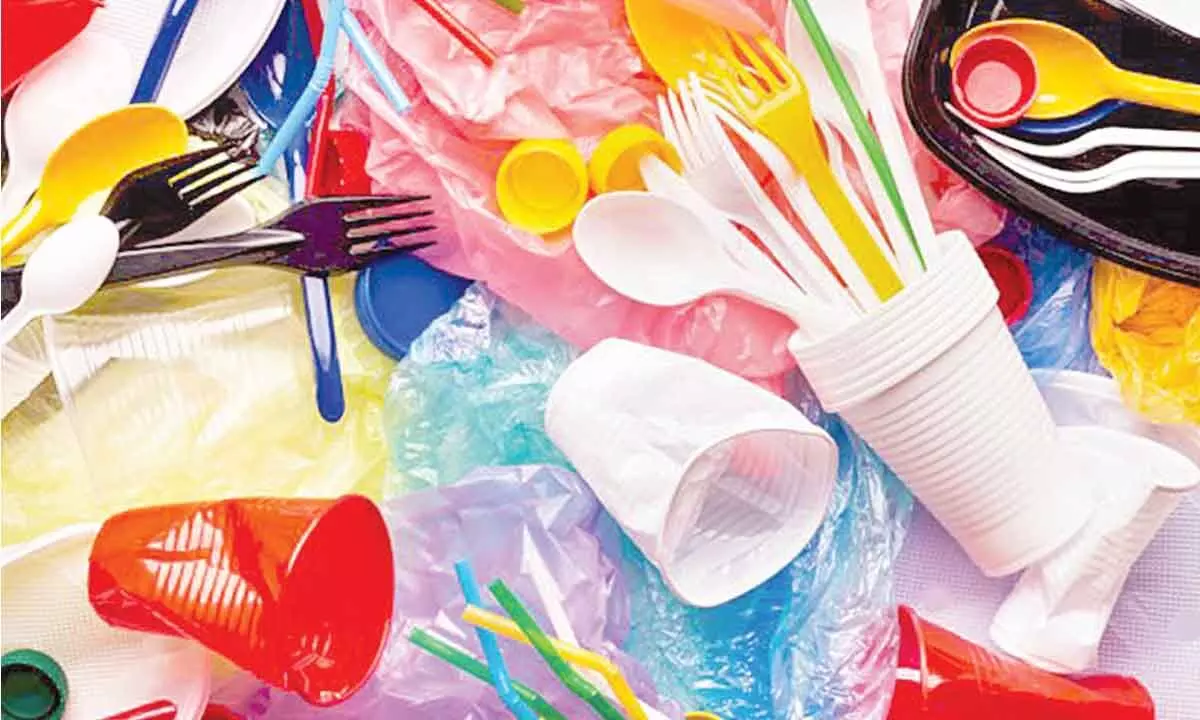Plastic ban must be properly imposed
Beginning the first of this month, Centre prohibited the production, distribution, stocking, and sale of single-use plastic
image for illustrative purpose

The intention behind the ban on single-use plastic (SUP) is good, but will it be effective?
Let's begin with the magnitude of the problem. The Central Pollution Control Board (CPCB) carried out a study in 2015 titled 'Assessment & Characterization of Plastic Waste Generation in 60 Major Cities.' It found that the total municipal solid waste (MSW) generated in 60 cities "was about 50,592 MT/Day, out of which the average plastics municipal solid waste generated was about 6.92 Kg/MT, i.e. an average of about 6.92% of plastics municipal solid waste is generated."
Experts believe that now plastics in MSW may be over 10 per cent, but what is more dangerous is the fact that there is evidence suggesting that micro-plastics are entering the food chain. In other words, more than the quantity of plastics in solid waste, it is their toxicity that is lethal.
Beginning the first of this month, the government prohibited the production, distribution, stocking, and sale of SUP. It has made it clear that the violators will be punished with a fine, a jail term or both, as per Section 15 of the Environment Protection Act (EPA) and the bylaws made by various municipal corporations.
"At the 4th United Nations Environment Assembly in 2019, India had piloted a resolution on addressing single-use plastic products pollution, recognising the urgent need for the global community to focus on this very important issue. India has today taken a defining step to curb pollution caused by littered and unmanaged plastic waste by banning single-use plastic," Environment Minister Bhupender Yadav said.
While some FMCG companies are grumbling about the impact of the ban on SUP, a report by Kotak Institutional Equities did not find much impact on listed FMCG corporations. "The current ban covers items which have a low utility and high littering potential. These are not widely used by large consumer companies and hence will have a limited impact for now," the report said.
The list of proscribed items is long- ear-buds, plastic crockery items (spoons, plates, glasses, etc.), plastic carry bags less than 75 microns in thickness, straws, cigarette packs, sweet boxes, candy and ice cream sticks, PVC banners, etc. Jute bags and bags, bamboo straws, etc., are the alternatives the government has suggested.
However, the availability of alternatives is an issue. There is concern about the effectiveness of the ban. Earlier too, polythene bags were banned. General experience is that the local authorities are strict in the beginning, but gradually they become lax. Major organized retail chains and big showrooms do discourage the use of plastics, but street hawkers, vegetable and fruit venders, etc., observe the rules in the breach.
If this happens again, the production, distribution, stocking, and sale of polythene bags will just go underground, notwithstanding Section 15 of the EPA and the myriad bylaws.
Hopefully, the latest ban on plastics doesn't meet the fate of the earlier prohibitions. Political will and administrative alertness, however, can make the move successful.

